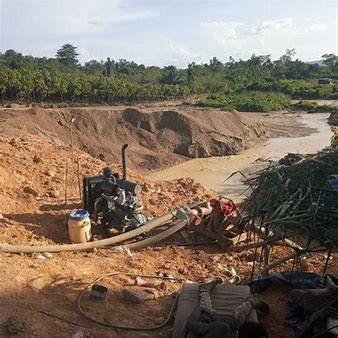Ghana's Fight Against Illegal Mining (Galamsey): A Growing Concern
Illegal mining, commonly referred to as galamsey in Ghana, continues to be a significant challenge for both the government and local communities. The practice, which involves unregulated mining of minerals, particularly gold, has contributed to the degradation of Ghana's environment, threatening vital water bodies, farmland, and the livelihoods of thousands of people. In recent years, the government has made efforts to clamp down on these activities, but the issue persists as illegal miners find new ways to evade the law.
Environmental Impact
The most visible and damaging impact of galamsey is the destruction of Ghana’s natural resources. Rivers that once served as clean water sources have been polluted with mercury and other toxic chemicals used in illegal mining processes. This pollution not only poses health risks to local populations but also threatens biodiversity. Key rivers such as the Pra and Birim have been heavily affected, forcing some communities to rely on unsafe water for drinking and agriculture.
Aside from water pollution, illegal mining also contributes to deforestation. Miners often clear large portions of forest to access gold deposits, further exacerbating the loss of biodiversity and contributing to climate change. The absence of proper land reclamation practices leaves vast areas barren and unproductive long after mining activities have ceased.
Government Response
In response to the growing environmental crisis, the Ghanaian government has initiated several military operations aimed at eradicating galamsey activities. In October 2024, for instance, a military task force destroyed 18 changfans (machines used in illegal mining) and 10 water pumps on the first day of a new operation against illegal miners. The government’s approach also includes seizing equipment and prosecuting offenders. However, the scale of the problem makes it difficult to sustain these efforts, especially when illegal mining activities are deeply rooted in some communities where miners depend on the income for survival.
Despite the government's tough stance, some argue that a more holistic approach is needed. This could involve creating alternative employment opportunities for those involved in illegal mining, along with stricter enforcement of environmental laws and greater community engagement. Lawmakers, such as MP Sam George, have stressed that tackling the problem requires collective responsibility from all sectors of society.
Conclusion
While the government’s crackdown on illegal mining continues, it is clear that galamsey remains a persistent threat to Ghana’s environment and public health. Moving forward, a combination of enforcement, education, and alternative livelihood programs will be essential in addressing this pressing issue and safeguarding Ghana's natural resources for future generations.



No comments yet
Be the first to share your thoughts!